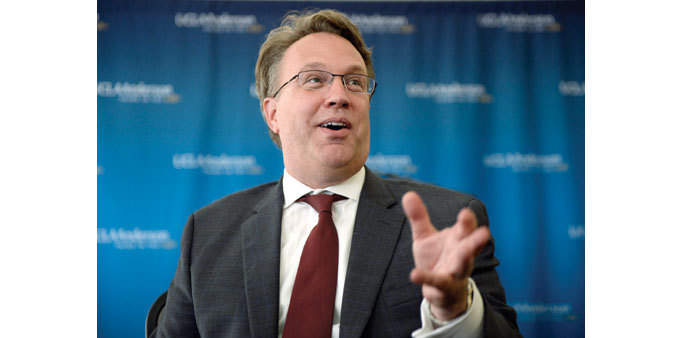Williams: More optimistic about the economy than in prior years.
Reuters
San Francisco
The Federal Reserve aims to keep the US economy running hot next year to boost the job market and inflation, a top central banker said, and to achieve that goal interest-rate hikes will be slow but will not follow any predictable pattern.
“Every meeting will truly be live in terms of adjusting policy one way or the other,” San Francisco Federal Reserve Bank President John Williams told Reuters in an interview, referring to the Fed’s policy-setting meetings.
Fed officials on Wednesday unanimously backed an increase to the central bank’s benchmark interest rate target, lifting rates from near zero for the first time since the financial crisis. The policy meeting had been widely anticipated as ending in a rate hike.
Afterwards, attention turned immediately to the likely timing of the next move. Many economists have latched on to March as the most probable, in part because that would coincide with Fed Chair Janet Yellen’s next scheduled press conference.
Fresh forecasts from the Fed suggest policymakers are looking for about four rate hikes next year. Williams – who worked for Yellen when she ran the San Francisco Fed before handing the reins to him, and whose views are seen to align closely with hers – said his own view is in line with that expectation. The Fed meets eight times a year.
“You might immediately jump to the conclusion that it’s every other meeting,” Williams said, referring to the likely timing of next year’s rate increases. “But as we’ve learned over the last several years, the economy does not always perform as forecast.”
Though much more optimistic about the economy than in prior years, Williams said that at the end of this week’s meeting, there was no round of high-fives among the 17 policymakers at the table.
“We are not done: we still have inflation unquestionably running stubbornly low due to mostly, I think, global factors,” he said. To keep job creation strong, rates will need to stay low, rising only modestly next year, he said, adding: “We are going to run a higher-pressure economy for a while.”
If the economy springs any surprises, he said, the Fed will respond as needed. And Fed policymakers could decide to raise rates even at meetings when Yellen does not hold a scheduled press conference, he said.
“There was value to having the first move at a press conference meeting,” Williams said, “but in the future I don’t think that’s as much of an issue.”
Yellen, in her news conference immediately following Wednesday’s decision, also emphasised that rate hikes, though gradual, would not necessarily be all a quarter of a percentage point or evenly spaced in the calendar year.
In a wide-ranging, hour-long interview at the San Francisco Fed’s headquarters, Williams said he expects easy Fed monetary policy to help push the unemployment rate, now at 5%, down to around 4.5% by the end of next year.
On inflation, he saw it rising towards the Fed’s 2% goal next year as the effects of a strong dollar and falling energy prices dissipate.
He did not see a need for the economy to run hot any more by 2017, saying: “I just need it to be running at kind of a steady pace.”
That second, slower stage of economic growth in 2017 and 2018, he said, will occur as the Fed gradually raises its target interest rate to around 3.25% to 3.5%, a level he sees as the likely long-run neutral rate.
Williams said he is “completely confident” that the Fed’s timing on its first rate hike was appropriate. Even so, he said, there’s “some kind of probability,” perhaps about 10%, that a shock could hit the economy and send it back into recession.
If that happens, he said, the Fed would not hesitate to cut rates and perhaps buy more bonds or promise to keep rates low for a certain period of time. These are tools it used after the financial crisis to ease monetary policy when rates were already near zero.
“We are still in a situation where most of our tools are fully employed. It’s like an army that’s got all of your forces out there, you don’t have a lot of reserves,” said Williams.

